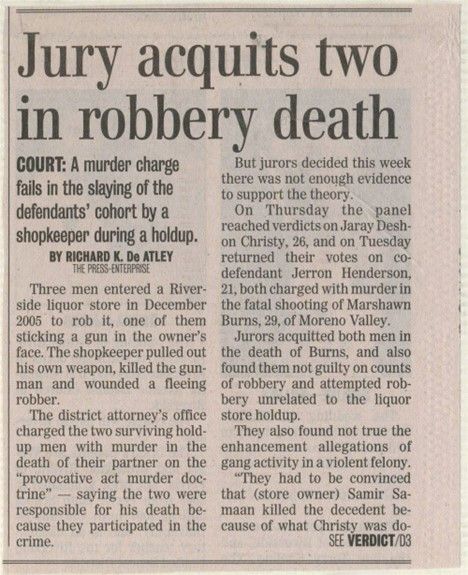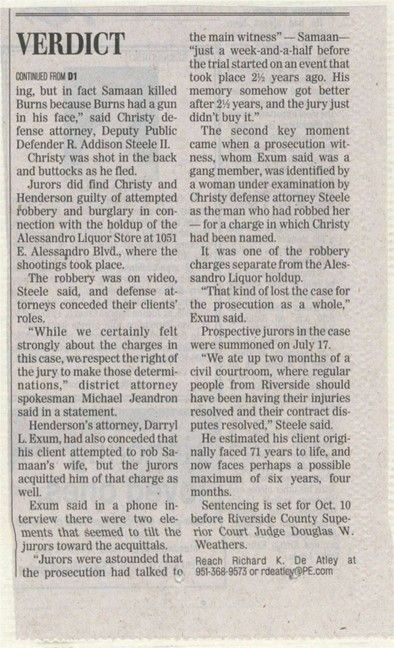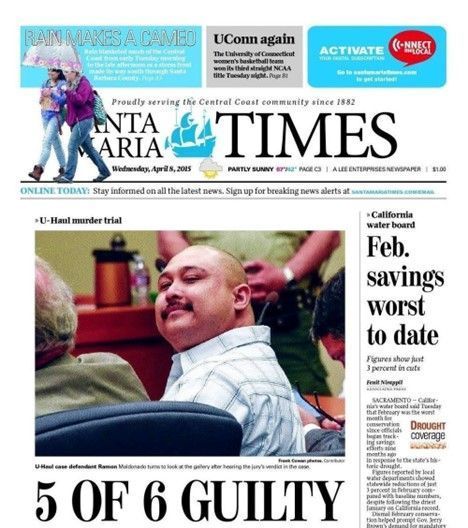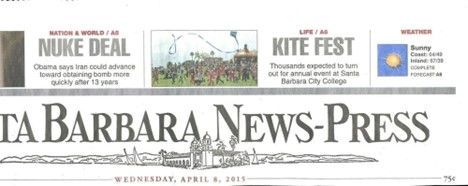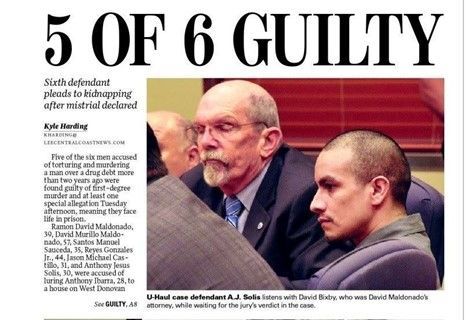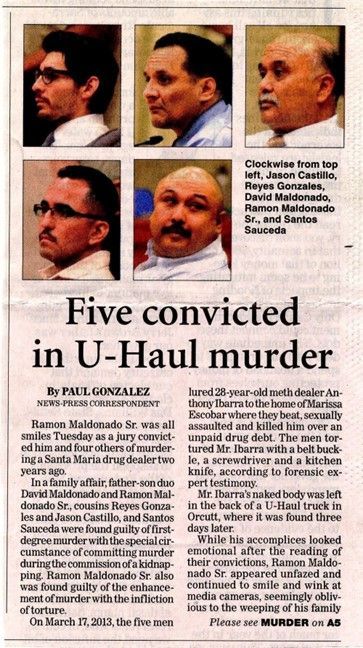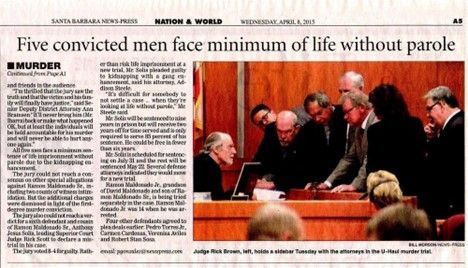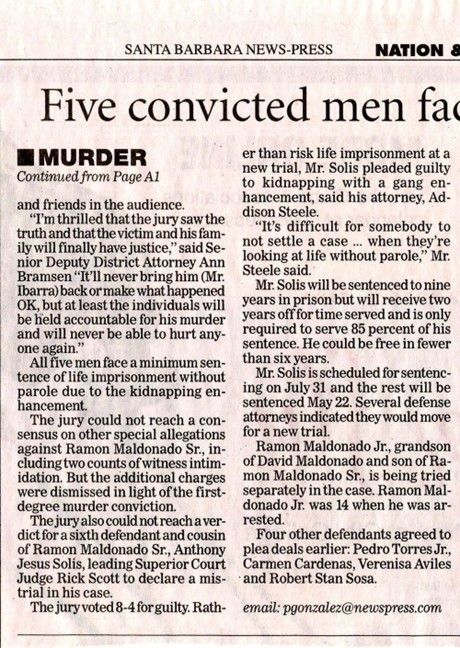Postero proelio prospere propter victorias priores
Gang Cases
christine and Addison Steele have:
Extensive experience handling and conducting jury trials in gang cases. Gang cases are really specialty area in criminal defense. The gang statutes are designed to make it extremely difficult for the defense to prevail, but these cases can be fought and can be won. There have been recent changes in the law to address the lack of fairness in the gang statutes. Any gang case is serious. In almost all cases a gang allegation makes the case a strikes case. Addison has had success defending gang cases from drug cases with gang allegations all the way to homicide cases with gang allegations. Including a capital murder case where he defeated the gang allegation. For example he has 22 gang special allegations not reached because of acquittals on the charged crimes (Penal Code § 186.22(b)).
Twenty-two gang allegations not reached because of acquittals on the charged crimes, Jaray C, RIF127509, 15 gang allegations not reached because of fourteen not guilty verdicts and one acquittal by a granted Penal Code § 1181.1 motion, Robert M., RIF135704, three gang allegations not reached because of two not guilty verdicts and one acquittal by a granted Penal Code § 1118.1 motion, Rudy R., 1358729, three gang allegations not reached because of not guilty verdicts, and Willie M., RIF128452, a gang allegation not reached because of a not guilty verdict).
Three gang special allegations found not true (Jaray C., RIF127509).
(Penal Code § 186.22(b)).
Four uses of a gun for a gang crime allegations were not reached because acquittals on the charged crimes (Penal Code § 12022.53(e).
Acquittal on a gang activity charge
(Penal Code § 186.22(a)).
Two hung juries on a gang special allegation and later dismissed (Timothy B., RIF108947)
(Penal Code § 186.22(b)).
Hung jury on a gang activity charge (Robert M., RIF135704)
(Penal Code § 186.22(a)).
Hung jury on a gang homicide case with a gang special circumstance alleged (Anthony S., 143089)
(Penal Code §§ 190.2(a)(22) and 186.2(a)).
A non-filing after preliminary hearing of a three count terrorist threats all with gang allegations case (Joseph C., 1453148)
Gang cases are among the most difficult defense attorneys face. The gang statute is extremely complex. It is modeled after the federal RICO statute but is far more convoluted. It is also so poorly written that there is a litany of case law interpreting it. What that all means is that the law on gangs is complex. Most district attorneys' offices have deputy district attorneys that specialize in gang cases. Because of all of those reasons, it is critical to have an attorney who is experienced in handling gang cases, knows the gang statutes well, and knows the gang case law well. It, of course, helps to have an attorney who has experience beating gang charges and gang special allegations.
If you need to hire a lawyer for a gang case, you need a lawyer who has experience with gang trials and who has won gang trials that have gone before a jury. Addison has not only done many gang trials, he has had full acquittals on all the charges and special allegations in three gang trials, including two that were alleged gang homicides. He has done nine gang jury trials, and the prosecution has only been able to secure convictions against him on the gang charges or allegations in two of them. He also wrote a motion in a capital gang case attacking the gang's special circumstance that allowed the case to be a death penalty case. The motion was denied, but that denial was overturned by the appellate court, which eliminated gang allegations being a part of that trial. Addison's record of trial wins and attacking gang allegations through solid motion work is unparalleled.
Addison gang trial successes include:
Jaray C., RIF127509
- Charges: Murder (Penal Code § 187(a)) with a gang allegation (Penal Code § 186.22(b)) personal use of a gun (Penal Code § 12022.53(b) and gun use in a gang crime (Penal Code § 12022.53(e)), two counts of attempted robbery (Penal Code § 664/211) with gang allegations (Penal Code § 186.22(b)), gun use in a gang crime (Penal Code § 12022.53(e) and personal use of a gun (Penal Code § 12022.53(b)), two counts of felon in possession of a firearm (Penal Code § 12021(a)(1)), five counts of robbery (Penal Code § 211) with gang allegations (Penal Code § 186.22(b) and gun allegations (Penal Code § 12022(a)(1)).
- Exposure: Jaray was facing seventy-one years to life in prison.
- Outcome: Jaray was only convicted of a few charges, all of which were conceded to the jury because they were on videotape. He was acquitted of first-degree murder and the lesser degree of second-degree murder. He was acquitted of all personal use of a firearm charges and was acquitted of all possession of firearms charges.
He was acquitted of all gang charges and allegations. He was sentenced to four years and eight months in prison. He served that time and went home. He is now going to school and writing screenplays. The gang allegations were that Jaray was doing robberies for the benefit of the Santana Blocc Crips, however Jaray had been involved with the Santa Blocc Crips when he was very young and living in Compton. The jury did not buy the district attorney theory that the alleged crimes had something to do with a gang.
Jaray, Addison and the investigator on the case after the verdicts.
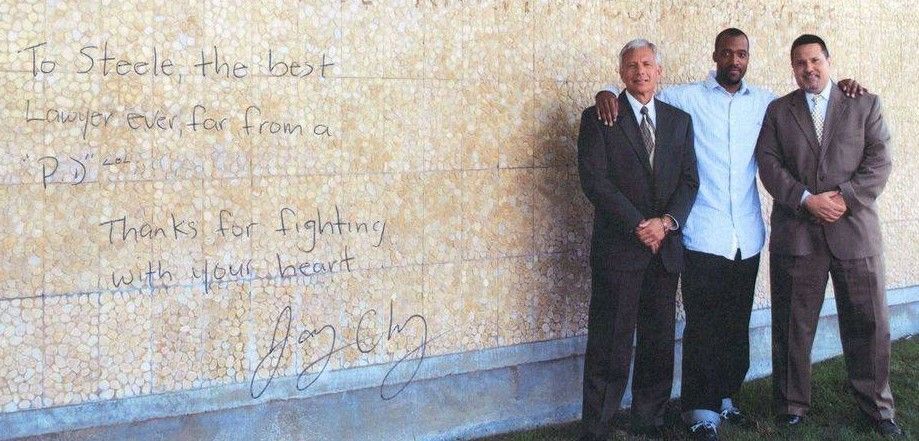
The newspaper article covering Jaray and Addison's victory.
Use this link to see all of Jaray's verdict forms, including many where the gang special allegations were found not true.
Rudy R., 1358729
- Charges: Murder (Penal Code § 187(a)) with a gang allegation (Penal Code § 186.22(b)) and three allegations of having served prior prison terms (Penal Code § 667.5(b)).
- Exposure: Rudy was facing twenty-eight years to life in prison.
- Outcome: Rudy was acquitted of first-degree murder, the lesser degree of second-degree murder, and the lesser included offense of voluntary manslaughter. The gang enhancements on the murder charge, the lesser degree, and the included offense were not reached because of the not-guilty verdicts, nor were the allegations of the prior prison terms.
- Below is the newspaper article on Rudy's acquittal.
Anthony S., 1434089
- Charges: Murder (Penal Code § 187(a)), with an allegation that the murder was committed at the direction of, for the benefit of, or in association with a criminal street gang (Penal Code § 186.22(b)(1)), with four special circumstances alleged, killing while lying in wait (Penal Code § 190.2(a)(15)), murder during a kidnapping (Penal Code § 190.2(a)(17)), murder with torture (Penal Code § 190.2(a)(18)) and killing while an active participant in a street gang to further the activities of the gang (Penal Code § 190.2(a)(22), if A.J. was convicted of first-degree murder and any one of alleged special circumstances was found true, the judge would have to sentence him to live life in prison without the possibility of parole.
- Exposure: A.J. was facing life in prison without the possibility of parole.
- Outcome: There was a hung jury, and the case was then settled for dismissal of the first-degree murder charge in exchange for a no-contest plea to kidnapping with a gang allegation with nine years in prison, the punishment for the ten additional years for the gang enhancement was stricken.
Below is the newspaper article on A.J.'s outcome.
Willie M., RIF128452
- Charges: Possession of crack cocaine for sales (Health and Safety Code § 11351.5) with a gang allegation (Penal Code § 186.22(b)) and gang activity (Penal Code § 186.22(a)), with a sales prior (Health and Safety Code § 11370.2(a)) and seven prison term priors (Penal Code § 667.5(b)).
- Exposure: Willie was facing fifteen years and eight months in prison.
- Outcome: Willie was found not guilty of possession for sales and not guilty of gang activity. He was only convicted of the conceded count of simple possession of crack cocaine. Because that was the only charge for which he was convicted, he had to be released from jail, granted probation, and given drug treatment pursuant to Proposition 36.
This is the Minute Order where Willie was acquitted of all the charges that weren't conceded, including all of the gang's special allegations.
Timothy B., RIF108947
- Charges: Robbery (Penal Code § 211) and commercial burglary (Penal Code § 459) both with personal use of a gun allegations (Pen Code § 12022.53(b)), gang allegations (Penal Code § 186.22(b)), gun use in a gang crime allegation (Penal Code § 12022.53(e)), serious felony prior (Penal Code § 667(a)) and two prior strikes (Penal Code § 667(c)&(e)(2)(A)/1170.12(c)(2)).
- Exposure: Tim was facing fifty-five years and eight months to life in prison.
- Outcome: All the gang allegations were hung, with the jury deadlocked nine to three in favor of finding the allegations not true. All those gang allegations were later dismissed by the district attorney. Unfortunately, Tim lost the robbery and commercial burglary charges and, as a three-striker, was sentenced to thirty years to life in prison. Tim will eventually get a parole hearing date while he's around fifty years old and will potentially be able to enjoy his retirement years as a free man. If we had lost the gang charges, he very likely would have been sentenced to fifty-five years to life in prison and, therefore, would not have his first parole hearing until his late seventies.
Robert M., RIF135704
- Charges: Murder (Penal Code § 187(a)) with a special circumstance of gang murder (Penal Code § 190.2(a)(22)) with personal use of a weapon (a knife) (Penal Code § 12022(b)(1)), assault with a knife (Penal Code § 245(a)(1)) and gang crime (Penal Code § 186.22(a)).
- Exposure: Robert was facing life in prison without the possibility of parole (LWOPP).
- Outcome: Robert was acquitted of first-degree murder, which meant that he could not subjected to the special circumstance of murder for the benefit of a gang and could not get LWOPP. He was also acquitted of the assault with a knife. The jury hung on second-degree murder and hung on the gang crime allegation ten to two in favor of acquittal. A different attorney did his second trial, and he was convicted of second-degree murder and gang crime.
Joseph C., 1453148
- Charges: Three counts of terrorist threats (Penal Code § 422) all of which had a gang special allegation (Penal Code § 186.22(b)).
- Exposure: Joseph was facing ten years and four months in prison.
- Outcome: After the preliminary hearing, the district attorney did not file any of the charges.
Questions You Should Ask an Attorney That You Are Considering Hiring for a Gang Case:
- Have you done a gang trial before?
- This question is important because a gang trial involves complex issues. Gang law is so complex, and there's case law with which the attorney must be very familiar. Gang cases require specialized knowledge and experience and are practically a sub-specialization of criminal law.
- Addison has done nine gang trials, five of which were gang homicide trials.
- What were the results of your gang trials?
- This question is important because in a gang trial, there are so many ways to fight hard and beat the charges, and that starts with vigorous motion work to attack and limit what can be presented by the prosecution. If an attorney has won gang trials, that attorney has the experience and skills to handle the level of complexity involved in a gang trial.
- Addison has had full acquittals on gang charges and allegations in gang trials, two of which were gang murder cases where the client was looking at a life in-prison sentence; he has had hung juries in two other gang trials and only had his clients convicted of the gang charges in two trials. If you find another attorney who has done the number of gang trials that he has done and has had more successful outcomes than he has had, and who has beaten gang murder cases, hire that person. If you want the best possible chance of not going to prison and potentially going home when facing gang charges, you should contact Addison.
- Do you train other lawyers in your techniques for winning gang trials?
- This question is important because, typically, only the leading lawyers in a field are invited to conduct training for other lawyers.
- Addison was a speaker at the California Public Defenders Association (CPDA) homicide defense training in 2011 to train on my winning trials by humanizing the client method. He has also been given the same training at the Santa Barbara County Public Defenders Office, Riverside County Public Defenders Office, Riverside County Barristers, Santa Clara County Public Defenders Office, and San Francisco County Public Defenders Office. He was a speaker at the CPDA homicide defense training in 2012 to train on utilizing a neuropsychologist in a homicide case. All these skills and techniques that he teaches are easily utilized in gang trials. He was one of the coordinators of the 2012 CPDA gang training seminar.
- How long were the gang trials you've done, and how many days of defense did you present?
- These questions are important because although some cases just call for a short trial, a short trial can also mean that the prosecution was not sufficiently challenged or that no defense was presented. A gang trial that lasts five or ten court days is reason for concern because it's an indicator that the prosecution is not being thoroughly challenged and a complete defense is not being presented.
- Addison has spent 248 court days in gang trials. Addison has a success rate in gang trials that is really unparalleled.
CONTACT INFORMATION
Email: christine@steelevoss.com & addison@steelevoss.com
Phone: (805) 245-5078
Address: 1226 1/2 State St., Suite 2, Santa Barbara, CA 93101


